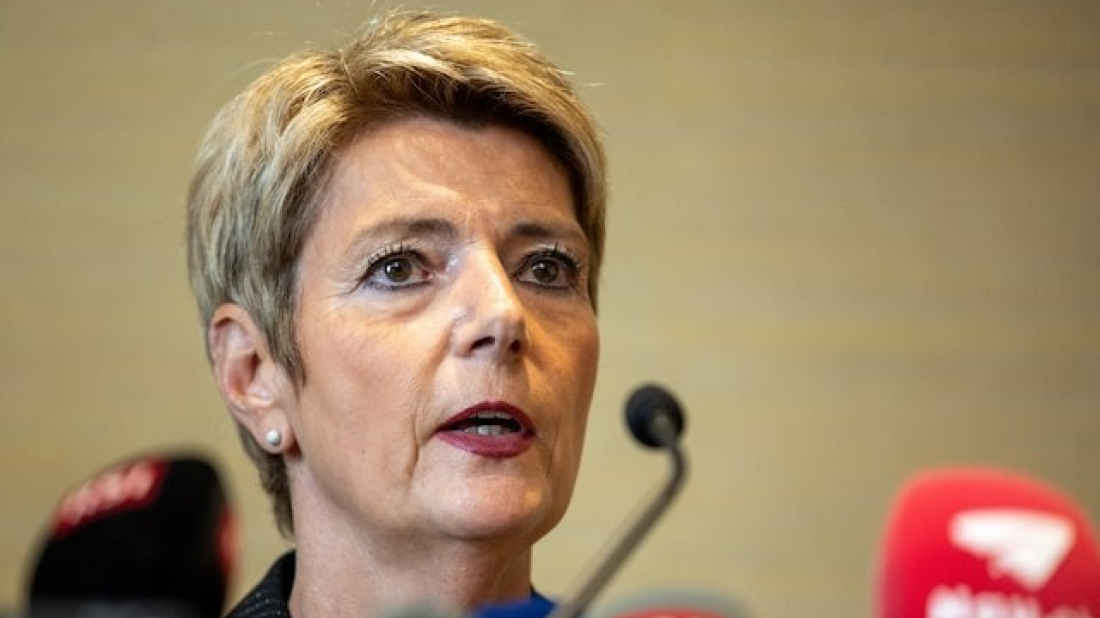Election of new Iranian supreme leader could help end regional conflict, Turkish FM says
The election of Iran’s next supreme leader could provide an opportunity to end the ongoing regional war involving Israel, the U.S. and ...

Switzerland will hold an emergency cabinet meeting in Bern on Thursday afternoon after President Karin Keller-Sutter returned from Washington without a deal to halt a 39% U.S. tariff, now in effect and threatening major damage to Swiss exports.
The Federal Council announced the extraordinary session in a post on X, shortly after the delegation returned from Washington. Keller-Sutter's visit ended without any direct talks with U.S. President Donald Trump or senior U.S. trade officials. A proposed compromise, capping the tariff at 10%, was rejected, a source said.
Swiss negotiators say talks will continue, though an agreement is not expected imminently. One insider noted the U.S. administration had not ruled out a resolution.
During the trip, Keller-Sutter met Secretary of State Marco Rubio. She described the encounter as “very good”. Swiss officials called it constructive and held in a friendly atmosphere.
The tariff was implemented at midnight in Washington, replacing a temporary 10% rate first imposed in April. On Truth Social, Trump wrote, “Billions of dollars… will start flowing into USA,” referring to countries targeted by the revised duties.
Despite removing most import duties in 2024 and granting broad market access to U.S. goods, Switzerland had faced pressure over its 38.5 billion Swiss franc trade surplus with America. That surplus rose 17% in the first half of this year, with exporters including Swatch front-loading shipments to avoid new tariffs.
Manfred Elsif, director of research at the University of Bern's World Trade Institute, called the 39% levy "insanely high", saying Trump's fixation on trade deficits damages relations with allies.
Hans Gersbach, an economist at ETH Zurich’s KOF Swiss Economic Institute, estimated a GDP loss of 0.3% to 0.6% over 12 months if the tariffs remain. “We will not enter a recession, but we are moving towards stagnation,” he said.
Swissmem, an association representing the country’s tech exporters, warned of severe consequences. “If this horrendous tariff burden remains in place, it will mean the de facto death of the export business of the Swiss tech industry to the USA,” the group said.
Economiesuisse, the country’s largest business federation, urged the government to keep negotiating. “They severely burden the international competitiveness of our companies in the U.S. market, jeopardise long-standing trade relationships and seriously endanger thousands of jobs,” said Jan Atteslander, a senior official at the group.
Swiss markets were stable in early trading. Blue chip stocks rose 0.44%, and the franc gained 0.2% against the dollar. IG broker Chris Beauchamp said: “Markets are very good at pricing in tariff impacts it seems, and the lack of any drama so far on Swiss markets suggests a hope of some form of deal in the coming weeks.”
Talks between the two sides are expected to continue, but there is no clear timeline for resolving the tariff dispute.
U.S. President Donald Trump said the U.S. military has enough stockpiled weapons to fight wars "forever"; in a social media post late on Monday. The remarks came hours before conflict in Iran and the Middle East entered its fourth day.
U.S. first lady, Melania Trump chaired a UN Security Council meeting on children and education in conflict on Monday (2 March), a move criticised by Iran as hypocritical following U.S. and Israeli strikes that triggered a UN warning about risks to children.
A torpedo from a U.S. submarine has sunk an Iranian warship off the coast of Sri Lanka, U.S. Secretary of Defense, Pete Hegseth told reporters. The Sri Lankan navy carried out a rescue operation for dozens of sailors in the wake of the strike.
The U.S. embassy in Riyadh was hit by two drones resulting in a limited fire and some material damage, the kingdom's defence ministry said in a post on X on Tuesday, citing an initial assessment.
The U.S.-Iran crisis has entered its third day, with further strikes reported across the Middle East and the death toll rising. Oil prices have surged to levels last seen during the Covid-19 pandemic, raising fears of economic disruption and higher prices worldwide.
U.S. Defense Secretary Pete Hegseth says the United States is making gains in its conflict with Iran after a key Iranian naval target was destroyed, confirming that the strike was carried out by a U.S. submarine off the coast of Sri Lanka. Rescue efforts are now under way for the ship’s crew.
Start your day informed with AnewZ Morning Brief. Here are the top news stories for the 4th of February, covering the latest developments you need to know.
Strikes across the Middle East are intensifying, fuelling travel disruption, driving up global energy prices and forcing diplomatic missions to shut their doors.
U.S. President Donald Trump has said the United States has a “virtually unlimited supply” of munitions and is capable of sustaining military action indefinitely, as the conflict with Iran entered its fourth day.
The United Nations has called for an investigation into a deadly attack on a girls’ primary school in Iran, which Iranian officials say has killed more than 100 children. The U.S. has said its forces “would not” deliberately target a school.
You can download the AnewZ application from Play Store and the App Store.

What is your opinion on this topic?
Leave the first comment